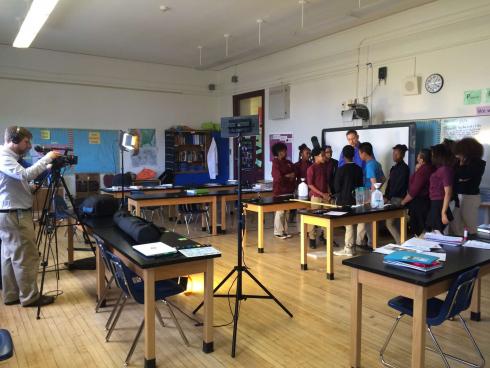
Alison Wood 202-633-2376 WoodAC@si.edu
“STEM in 30” Expands Museum’s Educational Outreach
How is food prepared and packaged for space? What keeps hot air balloons aloft? How do satellites in orbit stay put? The National Air and Space Museum’s newest webcast series, “STEM in 30,” explores these questions and many more. Through live, fast-paced, 30-minute STEM (science, technology, engineering and math) webcasts, this series will connect museum curators and educators to classrooms around the country, enabling students to access the museum’s galleries and collections from anywhere in the world.
“As we designed this series, our objective was to increase interest in STEM subjects,” said Mark Kornmann, director of the Office of Public Engagement at the National Air and Space Museum. “By featuring museum artifacts and involving our curators, some of the foremost experts in their fields, we can present meaningful information in an engaging way.”
“STEM in 30” webcasts are designed for students in the sixth to eighth grades and cover a wide range of topics relating to aeronautics and aerospace. Webcast episodes can be viewed by students on their own or in a classroom setting. To enhance the learning experience and create a dynamic teaching tool, “STEM in 30” uses the interactive CoveritLive system to allow classes to get directly involved with the content through poll questions and classroom activities. Many episodes have related lesson plans that meet Next Generation Science Standards.
“STEM in 30” hosts Beth Wilson and Marty Kelsey bring years of museum and middle school education experience to the program. Beth Wilson has worked as an education specialist at the museum for 10 years, and Marty Kelsey started as a manager for education outreach in January 2015 after teaching for Liberty Public Schools in Liberty, Missouri for 16 years.
“STEM in 30” episodes are presented live online at least once a month during the school year, and archived sessions can be viewed on the “STEM in 30” website at any time. There will be three more episodes this school year: “WWI: How History Shaped Technology” April 8 at 11 a.m. and 1 p.m., “Earth Day: Earthrise and Photography from Space” April 22 at 11 a.m. and 1 p.m. and “Living and Working in Space” May 20 at 11 a.m. and 1 p.m. New “STEM in 30” episodes will then resume in August for the start of the school year.
“STEM in 30” is made possible through the support of NASA, Boeing, Alcoa Foundation, Gertrude E. Skelly Charitable Foundation, Safran and AAR Corp.
The National Air and Space Museum building on the National Mall in Washington, D.C., is located at Sixth Street and Independence Avenue S.W. The museum’s Steven F. Udvar-Hazy Center is located in Chantilly, Va., near Washington Dulles International Airport. Attendance at both buildings combined exceeded 8 million in 2013, making it the most visited museum in America. The museum’s research, collections, exhibitions and programs focus on aeronautical history, space history and planetary studies. Both buildings are open from 10 a.m. until 5:30 p.m. every day (closed Dec. 25).
# # #
STEM in 30 host Marty Kelsey and eighth grade students at Jefferson Academy prepare to test composites in this behind-the-scenes picture from the "Lighter, Stronger, Better: Composites" episode of STEM in 30.
STEM in 30 hosts Marty Kelsey and Beth Wilson.
In this behind-the-scenes picture from the STEM in 30 episode "Space Junk: Fast Trash," former astronaut Donald Thomas talks to sixth graders at Friendship Public Charter School about spacesuits.